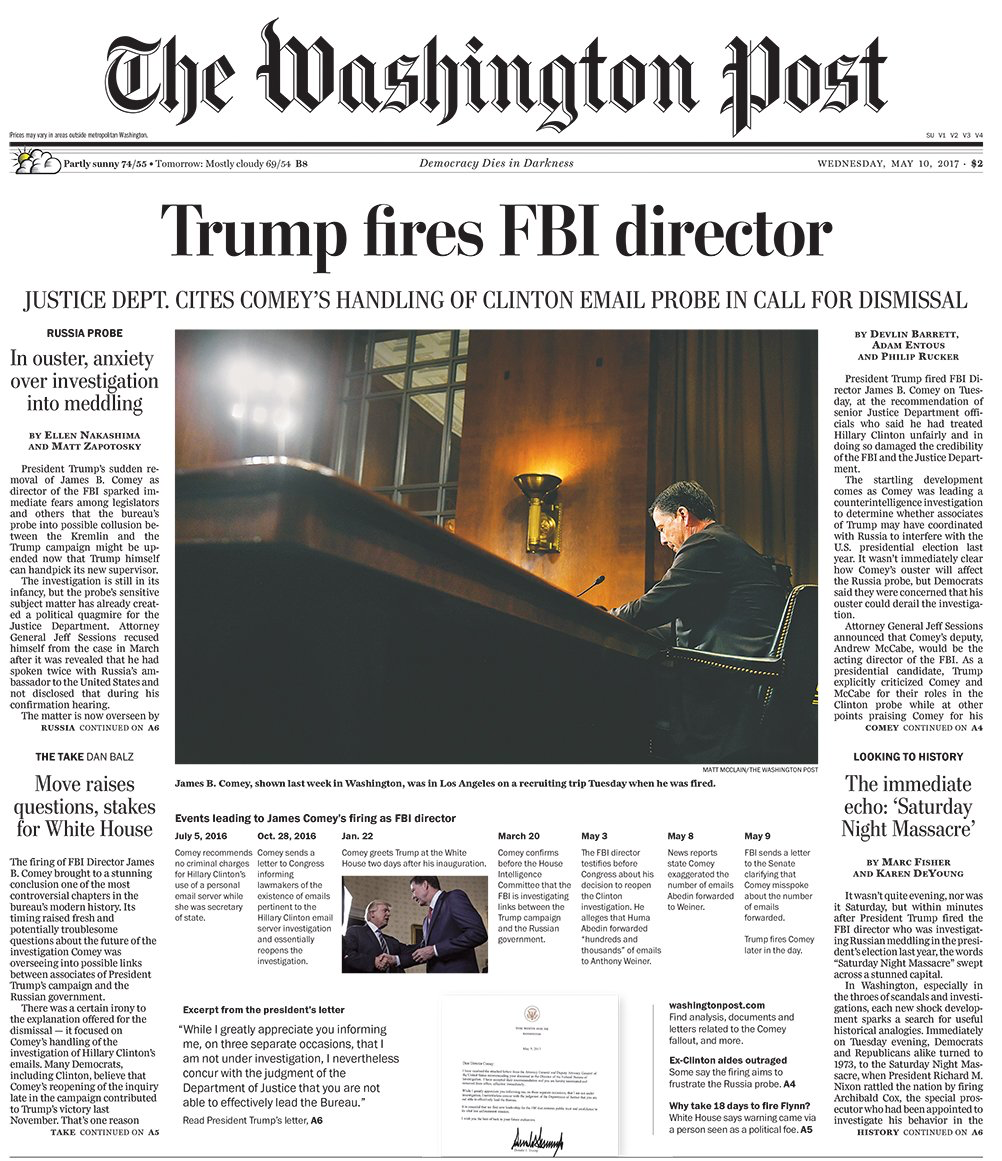After Trump’s dismissal of James Comey, CNN legal analyst Jeffrey Toobin spoke for many when he wondered aloud on air “What kind of country is this?”
When the now former Director of the FBI first saw news of his firing this past Tuesday, according to media reports, he thought it was a joke.
So did much of the rest of the country. Washington was, simply, stunned. And even in its current unpredictable and unprecedented state, where nothing really surprises anyone anymore, it’s still relatively unusual to describe the nation’s capital as being stunned.
Perhaps we should get used to it. There is clearly more to come.
On Wednesday morning, Russian foreign minister Sergei Lavrov “joked” with reporters about not hearing of the dismissal ahead of a meeting with the man who had pulled the trigger.
Regardless of the optics surrounding this increasingly surreal situation and what they might mean for President Trump and his administration, the FBI, the Justice Department – and the country – there is little here that is remotely funny.
In the space of the past 48 hours, we’ve seen former acting Attorney General Sally Yates – who had also been fired by Trump supposedly for something other than anything to do with Russia – testify that the White House was aware that former National Security Advisor Michael Flynn could be compromised by the Russians. It also emerged that President Obama had warned his successor against hiring Flynn.
We’ve seen Attorney General Jeff Sessions – who had previously said he would recuse himself from any investigations of last year’s campaign – nonetheless recommend that the FBI Director be fired.
We’ve heard dire warnings of a “constitutional crisis” – it’s not, yet, say legal experts – as well as almost endless echoes of Richard Nixon’s 1973 “Saturday night massacre” where he fired Watergate investigator Archibald Cox, prompting the resignations of Attorney General Elliot Richardson and his deputy William Ruckleshaus.
The Nixon Library even ended up trolling us all by tweeting that Nixon “never fired the Director of the FBI”.

Washington was left stunned by the announcement
(Bizarrely, Trump did little to dispel the Watergate imagery by wheeling out Nixon’s Secretary of State Henry Kissinger at a photocall after his meeting with the Russians – a meeting at which visiting media access was prioritized.)
We even saw Vladimir Putin, in hockey gear, telling CBS News that the firing wouldn’t have an adverse effect on US-Russian relations. And that Trump was “acting in accordance with his competence.”
According to the New York Times on Wednesday morning, Comey had requested additional resources to expand the Russia investigation days before his firing. The Justice Department denied that was the case, while the FBI stayed silent.
At the same time, the administration’s communications approach appeared at least disjointed, from the spectacle of spokesman Sean Spicer hiding in bushes to sending out his deputy, Sarah Huckabee Sanders, to push the message that, hey, it’s “time to move on” from the whole Russia investigation thing.
Vice President Mike Pence also took to the cable news shows to defend the firing while Fox News amplified the requisite talking points.
It all helps suggest that there may well be little co-ordinated “White House” strategy – rather it’s just Trump himself setting the course and everyone else subsequently scrambling to interpret and defend whatever he does.
The news cycle has been shortened to minutes, in some cases, as each successive development – every presidential Tweet – rocks the ship of state still further and re-ignites the fire under the media.
It even got to the point on Wednesday where CNN appeared to be in a direct dialogue with Trump; with anchor Chris Cuomo telling the President “we appreciate the viewership” after he had reacted on Twitter to a story the network was covering.
Cuomo then continued: “Mr. President, you should say we need a special prosecutor. Endorse Congress passing that legislation, sign it and put everybody’s fears to rest that this can be done without influence or contagion.”
So – dare we even ask – what happens next?
Constitutionally and procedurally, next steps will turn on Republican senators who will come under more pressure to appoint a special prosecutor. But, despite some Republicans saying they had been “troubled” by Comey’s firing, movement on that front seems unlikely after Democratic leader Chuck Schumer’s call on Wednesday morning was quickly rejected by majority leader Mitch McConnell.
The acting FBI Director, Andrew McCabe, is scheduled to testify before the Senate Intelligence Committee on Thursday in place of his former boss. Comey himself, meanwhile, in his new capacity as a private citizen, has been invited to appear next Tuesday.
Trump has promised he will choose a new director who will “bring back the spirit and prestige of the FBI.” He also tweeted that Comey had lost the confidence of “almost everyone” in Washington. “When things calm down, they will be thanking me.”
Through it all, though, members of the Senate committee appear to be becoming increasingly interested in Trump’s financial relationships.
The President is to sit down on Thursday afternoon with NBC anchor Lester Holt to tape an interview that will air that evening. CNN’s media correspondent Brian Stelter says it could well be the “biggest interview of Trump’s presidency.” The stakes are undoubtedly high on both sides of the camera.
If it goes ahead, it will certainly be the biggest interview he does this week.
As for next week, lets wait and see.
Also published on Medium.
